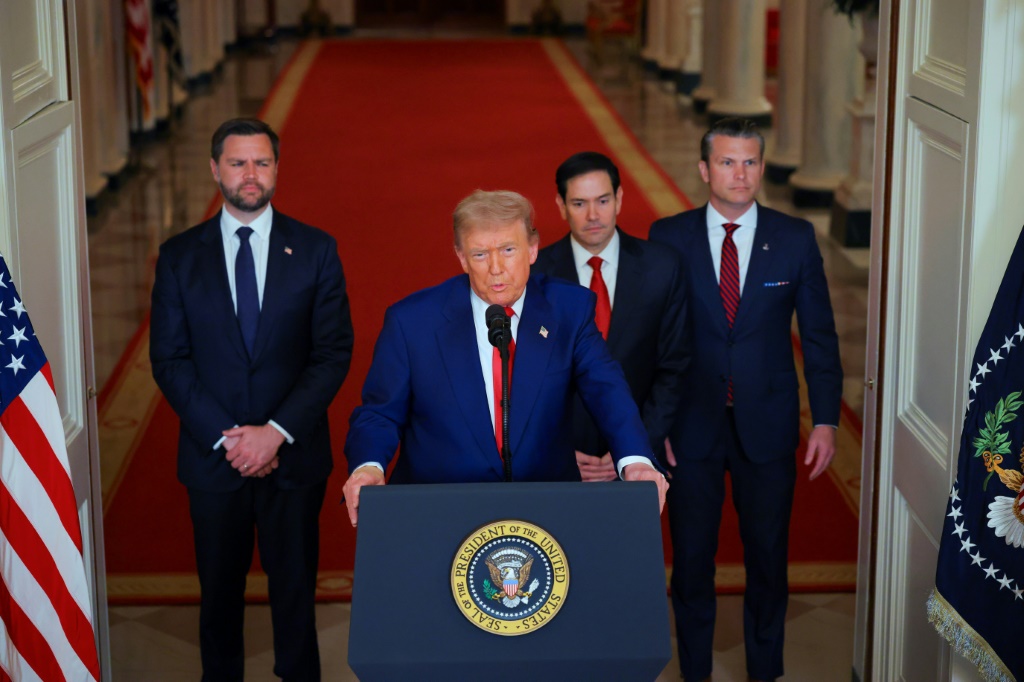
Following the US airstrikes on Iran's nuclear facilities, President Donald Trump threatened the country with further attacks. "There will either be peace or a tragedy for Iran far greater than what we have seen in the past eight days," Trump said in a televised address to the nation on Saturday (local time). UN Secretary-General António Guterres expressed concern, and Israeli Prime Minister Benjamin Netanyahu sees the Middle East at a "historic turning point."
In his address on Saturday evening, Trump was flanked by Vice President J.D. Vance, Secretary of Defense Pete Hegseth, and Secretary of State Marco Rubio. He further stated that the US attacks had "completely and totally destroyed" Iran's main nuclear enrichment facilities, but that many targets remained. If Iran did not make peace quickly, the US would target them.
Tehran had threatened attacks on US forces in the Middle East if the US intervened in the war against Israel. After his speech, Trump warned Iran of possible counterattacks. "Any retaliation by Iran against the United States of America will be met with far greater force than what occurred tonight," he declared on his online platform Truth Social.
Trump had previously announced a "highly successful attack" by the US military on three Iranian nuclear facilities. "We have completed our highly successful attack on the three Iranian nuclear facilities: Fordow, Natanz, and Isfahan," Trump declared on Truth Social.
He stated that "a full load of bombs" had been dropped on the important uranium enrichment facility in Fordo. All US aircraft involved had safely left Iranian airspace and were on their way home, he added, praising the efforts of "our great American fighters." Referring to the bombing of Iran's deep underground nuclear facilities, he stated that "there is no other military in the world that could have done something like this."
Trump returned to the White House late Saturday afternoon, where he chaired another meeting of the National Security Council. Two days ago, the US president had declared that he would decide on US military intervention in the war within two weeks. On Friday, he gave Tehran "at most" two weeks to respond to the dispute over its nuclear program.
Iranian President Massoud Peseschkian said on Saturday that Iran would not stop its nuclear program "under any circumstances." Referring to Israel's ongoing "aggression," Peseschkian threatened an "even more devastating" Iranian response.
Following the US airstrikes, UN Secretary-General António Guterres warned of a "spiral of chaos" and called for a "diplomatic" solution. He called the attacks "a dangerous escalation in a region on the brink and a direct threat to international peace and security."
Israeli Prime Minister Benjamin Netanyahu, on the other hand, congratulated Trump on the "daring" attack on Iran's vital nuclear facilities. Thanks to Trump, the Middle East is at a "historic turning point" that can lead the region "to a future of prosperity and peace," Netanyahu said in a video message on Sunday.
Meanwhile, the Iranian Atomic Energy Organization announced that Iran will continue its nuclear activities despite the US attacks. It will "not allow" the development of Iran's nuclear program to be "halted," the organization said in a statement published by state media on Sunday.
Meanwhile, Iranian authorities declared there was "no danger" to the residents of the city of Kom, south of Tehran, where the Fordow nuclear facility is located. Iranian media had previously confirmed the attacks on the Iranian nuclear facilities in Isfahan, Natanz, and Fordow.
Israel launched a major attack on military targets in Iran on June 13. The stated goal is to eliminate the existential threat posed by both Iran's nuclear program and its missiles. Since then, the Israeli army has been conducting airstrikes against military and nuclear facilities in Iran. In response, Iran, in turn, has launched daily missile and drone attacks against Israel.
Western states have accused Iran of pursuing nuclear weapons for years, a charge Tehran denies. According to a report by the International Atomic Energy Agency (IAEA), Iran has significantly increased its stockpile of uranium enriched to 60 percent in recent months. An enrichment level of approximately 90 percent is required to build nuclear weapons.